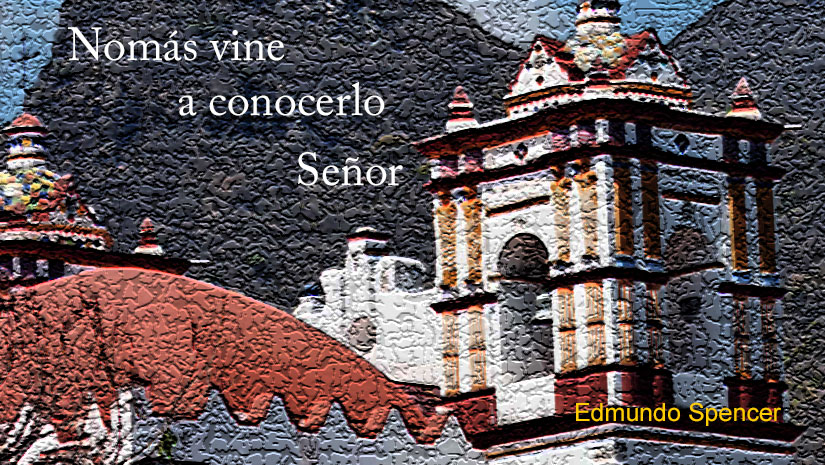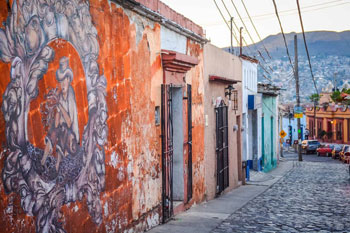I just came to meet you—
It happens more often than we assume.
[2col1]SOLEDAD MENDEZ nervously expected the question because she noticed that her son Mario, for the last days, had been very serious and thoughtful; so, she kept in the back her mind the firm intention that when the time came, she would not lie to him, she would simply tell him how things happened.
Soledad was born in a small town in the mountains of southern Mexico; her cheerful manner of speaking, her perennial smile, her fine facial features, and her dark skin, showed her descent from one of the ethnic groups of the many that exist in Mexico. She was about eighteen years old when her parents died in an unfortunate accident. Brakes failed the rickety passenger bus they were riding on their way back home after a short visit to the Virgin in the capital of the state. The bus fell into one of the many precipices that are in the mountains. Soledad felt that her body at that moment was falling apart, and with exsasperation she blamed the Virgin because she was supposed to take care of them and she didn’t. Soledad locked herself up in her humble home for many days to live her tremendous pain. Grief overcame her and she shut herself up in an understandable silence for many days. One day she decided to shake off the mourning she was living in, took off her black dress, and after a few minutes of personal hygiene, left that confinement and with determination walked towards the house of the best-settled family in town and sold them her inheritance: a piece of sowing land (100 meteres squared), and the old adobe house. Perhaps she didn’t know or may be she did, but inadvertently, Soledad started living up to her name (soledad means solitude) she was alone in the world.
In those days the rumor of the famous “American dream” floated insistently in the enviroment. Soledad long before her parents died, dreamed of the possibility of making that famous dream a reality. With remnants of sadness in her, she came out well dressed from what was her little house carrying in her right hand a medium size suitcase, didn’t say goodbye to anyone and did not tell anyone where she was going. She just boarded an old passengers bus and went to chase her dream. They had painted the north as an open and generous country where it was possible to earn enough money without having to work so much. Nothing could be further from reality, she realized that years later.
Soledad never imagined that crossing the border was so complicated. She spent interminable nights crying in desperation in a room of a cheap hotel. There were many times that, repeatedly, the idea of returning to her small town nestled in the mountains of southern Mexico hit her brain but, ?What for? I have nothing over there any more, ?she used to tell her self. After overcoming a number of challenges, she managed, advised by well-meaning people, to cross on foot by the river near a small town located on the American side called “El Polvo.” It was in that community where good fortune started smiling on her.
Don Ramón Casillas and his wife Dominga were owners of a great farm that adjoined the river. The hot afternoon that they met Soledad, they were taking a well-deserved rest sitting in two wicker rocking chairs under the shade of two leafy poplars that also served as an umbrella for the house, since the front of it, faced the side where the sun sets. Fresh gusts of wind were felt from time to time to the liking of those two people of mature age. Ramon suddenly caught the sight of a figure stumbling over the crops with difficulty.
“Someone comes?” he said with uncertainty, and pushed by his altruism, he stood up and diligently walked to meet Soledad, took the bundle from her back and gently led her to the house.
“What are you doing girl?” Ramón asked in his peculiar northern Mexico accent “Andale Minga, prepare something to eat for this girl; look how bad she looks.”
Dominga took her by the arm and kindly led her inside the house. Tears came to Soledad’s eyes and a shudder of relief seized her. “Don’t cry mi’jita, do not cry,” Dominga said with unspeakable tenderness. After a refreshing bath and after Soledad had enjoyed the food, the after dinner conversation took place.
Soledad, with great detail, slowly and clearly, told them all about her odyssey, and that aroused the sympathy of both Ramón and Dominga who decided to help her.
“Look, girl,” Ramón said in a tone that seemed to be speaking to one of his daughters. “I have a very rich oilman friend who lives in Odessa; his name is Frank Moore and his wife’s name is María. We’ll take you there and I’m sure they will know how to help you. Don’t worry about the language— María habla español!”
The trip to Odessa was made without any complications. Nevertheless, Soledad was nervous and at the same time dazzled by the beautiful panorama she was witnessing: ranches here, ranches there, spectacular mansions surrounded by trees adorning the landscape, the cattle grazing on the edge of the road protected with very firm fences made of barbed wire. Nothing compared with what she had left in her place of origin: Huts here, huts there made with adobe and reeds. Ramon, intelligently stopped the car in places that seemed strategic to him so that Soledad could see the panorama with ease.
[endcol] [2col2]Frank and Maria, knowing through Ramon Soledad’s situation did not object to employing her as a domestic even without knowing her. Soon, because of her diligent work in the household chores, she gained the sympathy of the rich family. In an act of sympathy, and sooner than latter, Mr. Moore helped Soledad to legalize her migratory situation in the country, and in a matter of months because of her great intelligence and help from Maria, she not only learned to communicate in English in an acceptable way, but also learned to drive a car.
“The American dream in all its magnitude,”she thought at night in the solitude of her bedroom, shedding tears of happiness.
Soledad lived in that mansion that she kept as bright as a mirror for about two years. Things changed radically one afternoon when Frank told her that because of their business, they needed to move to Houston. Soledad felt her sky crumble; however, Frank and Maria, in an act of gratitude, gave her a furnished house and a car.
Soledad once again live up to her name: she was alone. However, this time, circumstances were not the same; now she had better weapons to face up her situation. She had learned English, Indeed, she now was trilingual because she also spoke the Indian dialect in which she was raised, owned a house and a car, which is definitely indispensable. In her moments of solitude and already living in her house, there were times when thinking about Frank and Maria, the sadness invaded her because she felt as if she had lost her parents again. At least that was the feelings she felt toward those two beings who for nearly two years had treated her as if she were their own daughter. Soledad’s American dream seemed a concrete reality. Because she spoke English, she managed to get a job in a nursing home for the elderly. Everything went smoothly until she fell in love. This triggered a series of sufferings that lasted for many years: she fell in love with the wrong man. His name was Joaquín Salvatierra, a native of a community called El Paradero, very close to the border. He worked in construction. Soledad, with the nobility that characterized her, took him to live in her little house so that he would not have to pay rent. Soon, she found that she was pregnant and things began to change: Joaquín, during her pregnancy became nervous, indecisive, and sometimes verbally violent. On a beautiful summer day Mario was born but Joaquin dissappeared, his absence lasting many years.
Ten-year-old Mario was sitting at the table after dinner, and it was at that moment that the question which Soledad nervously expected arose:
“Mama,” he said without taking his eyes off the plate, and with a barely audible voice, “who is my dad?”
It was then when from the bottom of a chest, she took out a large envelope containing some photographs, photographs that she had not seen again for ten years because she was waiting for the right moment, and that moment had arrived.
“Your father’s name is Joaquín Salvatierra. The day you were going to be born, he came and then left me in the hospital and said: “I will return in a minute.” That minute, even after ten years, has nevert arrived. We were very young; he was twenty-one and I was twenty; we never married and that is why you have my last name.
The boy remained serious for a few minutes, staring straight ahead. He got up slowly from his chair and tenderly embraced his mother. “You are my mom and my dad,” he whispered in her ear.
Time passed and with much effort and sacrifice on the part of his mother, as well as under the patronage of the altruistic marriage formed by Frank Moore and Maria, Mario became a professional. He graduated with honors from the university with a doctorate in petroleum engineering. Frank himself employed him in his oil company with a large salary which enabled Mario to buy a beautiful house for his mother as a reward for everything she had done for him. Mario, feeling that he had fulfilled his duty as a son, decided to form his own family. But there was a thorn that bothered him, and he decided to take it out before getting married. That thorn had a first and last name—Joaquín Salvatierra. So for a short time and without telling his mother, he played the role of detective and finally found a person who knew Joaquín Salvatierra. That same person told him where Joaquín Salvatierra lived and gave him precise instructions on how to get to El Paradero.
“Mother, I’m going to be away for a few days; do not worry; everything will be fine.”
Soledad did not ask where he was going because she already knew, or at least, she suspected. She had noticed again,that he was serious and meditative. She wished him all the luck in the world and only said, “Treat him well; do not question him.”
That was an unnecesary commendation because there was no rancor nor hatred in Mario’s heart. Such was the way his mother had taughthim: “hate and rancor are not good for the soul.” All he wanted was to meet the coward that had fathered him. So, he got into his elegant truck and after a few hours, he crossed the border and went to the town where Joaquín Salvatierra lived. He knocked on the door of the humble dwelling and an old man came out to meet him. Mario had no doubt that this aging individual was the person he had been looking for. There was a certain similarity between the two of them. He just said:
“I am Mario Mendez; my mother is Soledad Mendez and I am sure you know her. I am also quite certain that you are the man who fathered me. I live in Odessa, Texas. I am at your disposal in case you need anything. I just came to meet you.”
Mario got into his elegant truck and came back home, and after a short time, got married and lived a happy life. He never forgot the last few words he told his father: I JUST CAME TO MEET YOU.
—Edmundo Spencer
[endcol] [clearcol]



